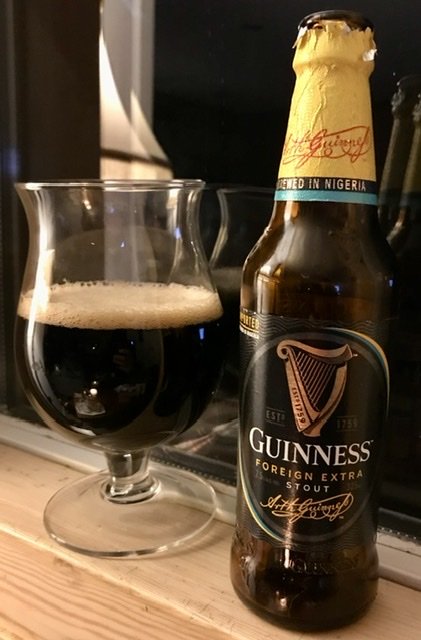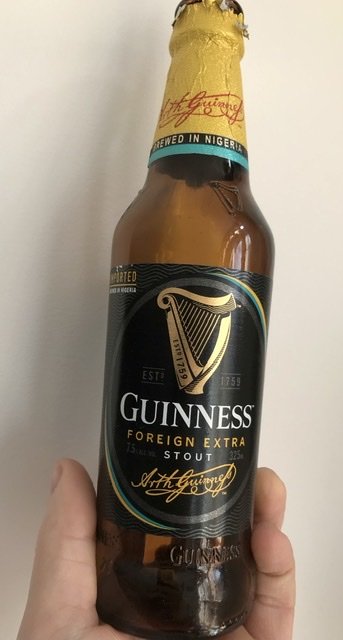Guinness Foreign Extra Stout Review - The Guinness With Adventure In Its Soul
There have been many iterations of the ubiquitous ‘black stuff’ since Arthur Guinness first started brewing in 1759.Recent innovations to come out of the St James’ Gate Brewery, Dublin, include their non-alcoholic variation, Guinness Draft 0.0. But, perhaps one of the most beloved is Guinness Foreign Extra Stout, or ‘Nigerian Guinness’ as some may better know it.
Inspired by Arthur, being a bit of an explorer himself it is no wonder that in the early 1800s, Guinness began exporting one of Ireland’s most famous products to the far-flung corners of the globe to the established colonies and stationed soldiers of the British Empire.
Brewed with extra hops to preserve the beer in the ships’ holds, during voyages of four-to-five weeks in humid tropical climates, Guinness Foreign Extra had time to ferment into the bold and powerful drink many enjoy today.
Originally known as Guinness West India Porter, its popularity in Asia, the Caribbean, and Africa led Guinness to open its first brewery outside the British Isles, in Ikeja, Nigeria. Breweries in Malaysia, Cameroon, and Ghana soonfollowed to meet the demand for this popular brew.
It was on November 30th, 1963, that the first bottle of Guinness Foreign Extra Stout rolled off the production line in Nigeria, three years after its independence from the UK. Today, the Foreign Extra we pick up in ‘the exotic’ aisle of the supermarket, next to the Dragon Stout, is imported to London from Nigeria, which is the world’s second-largest market for Guinness.
Many Nigerian beer drinkers consider Guinness Foreign Extra as their national beer and their passion for the black stuff rivals Guinness’s largest market, the UK. This became evident, in 2004, when Guinness sales in Africa beat those in the UK and Ireland.
Originally a bottle-conditioned beer, since 1948 Nigeria Guinness has been pasteurised to ensure quality consistency. Guinness says that although the stout has evolved throughout the ages, its soul has remained the same.
When you Leverage the cap away from the bottle, delicately tearing the yellow foil seal of a Guinness Foreign Extra, you feel like you are drinking something special, somethingindeed ‘extra’. Pouring black with a large two-finger tan head it is business as usual for Guinness. On the nose, however, it is a different story. The Coffee, caramel and liquorice aroma make this a far more satisfying and complex beast, owing to the extra hops and the triple threat of barley, malted barley, and roasted barely it is made with.
It is full-bodied and when tasted you still get a hint of liquorice or dried fruit in the taste with roasted coffee. A little chocolate gives it a sweetness and this is complimented by a slight bitterness in the finish.
At 7.5% Guinness ABV, it is a strong brew to be sipped and savoured rather than supped on, like you might on a pint of Guinness down your local.
I have been told many times that Guinness is ‘different’ or‘tastes better’ in the Irish pubs of Dublin. And the same is said of its exotic cousin on tap in the bars of Africa. Their version of Foreign Extra is brewed with Maize or Sorghum. It is said to have a more bitter profile compared to the stuff they ship to the UK.
And if you ever find yourself overseas, in Malaysia let’s say,and you fancy a Guinness, ask for a ‘Black Bulldog’. The story goes that the first export bottlers of Guinness used to add their own symbols to the label to distinguish their bottles and exclusive territories. There were dozens of different symbols apparently, the most famous of which were the bulldog, the wolf, the dog, and a cat.
If you liked the Guinness Foreign Extra Stout review, please feel free to share your comments below. We are happy to hear from you!
Written by Lee Penfold, follow him @idylicpen or by clicking here.
Read our other reviews here.
Follow OnlyCans on Instagram here.
Follow OnlyCans on Facebook here.
Follow OnlyCans on LinkedIn here.
Follow OnlyCans on TikTok here.


